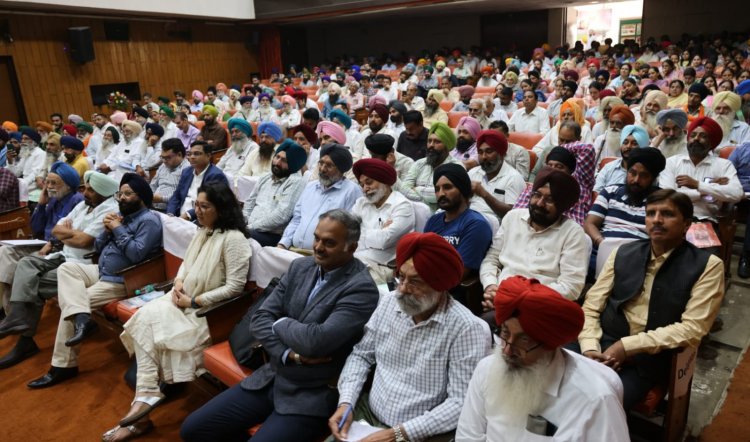At the National Conference on 'Crop Diversification and Climate Change,' hosted by Punjab Agricultural University (PAU), Ludhiana, in collaboration with Rural Voice and the NGO VillageNama, experts highlighted the urgent need for crop diversification as a vital step toward sustainable agriculture, capable of addressing environmental challenges and ensuring economic stability for farmers. The event drew a large gathering of farmers, policymakers, government officials, scientists, and experts.
Farmers from across Punjab converged at the Punjab Agricultural University (PAU) to attend the one-day national conference on Saturday. The Special Chief Secretary to the Punjab Chief Minister, V.K. Singh, was the chief guest on the occasion, while Dr. Satbir Singh Gosal, Vice-Chancellor of PAU, presided over the event.
Voicing concern over climate change leading to severe health and agrarian crises, V.K. Singh called for moving away from the traditional wheat-paddy cropping pattern, which he identified as the root cause of numerous emerging challenges. He pointed out the decline in the area under Kharif maize and the increase in the area under water-gulping spring maize, putting immense pressure on groundwater in addition to the water-guzzling paddy. Singh also emphasized the need to strengthen Punjab’s cooperative structure and advocated for a dedicated agency to promote crop diversification.
V.K. Singh, Special Chief Secretary to the Punjab Chief Minister, talking to participants at the agriculture exhibition
PAU Vice-Chancellor Dr Satbir Singh Gosal highlighted the visible risks of climate change, including more frequent extreme weather events, such as record heat in May and June this year. Dr Gosal noted that PAU has developed over 950 alternative crop varieties and continues to research sustainable methods, such as using mulch for soil enrichment and promoting shorter-duration rice varieties to save water. He underscored the potential for farmers to diversify with crops like cotton, maize, and vegetables, which offer both ecological and economic benefits. He also urged farmers to use PAU-recommended pesticides in basmati and cotton and emphasized agro-forestry and the marketing of horticultural crops.
Sharing his experience, Ajay Vir Jakhar, Chairman of Bharat Krishak Samaj, called for policies that genuinely address the challenges faced by farmers, emphasizing the importance of good governance and transparency. Calling for reforms to win the confidence of farmers, Jakhar underscored the importance of quality education in agricultural sciences; videographing meetings of the gram sabhas; and mandatory e-documentation in Governance.
In the welcome address, Dr Rashmi Sinha, Co-Founder of VillageNama, highlighted the impact of the climate crisis on future generations and cited alarming statistics on increased climate-related disasters in India. She called for collective action to combat climate-related issues.
Harvir Singh, Editor-in-Chief of Rural Voice, highlighted the importance of the conference. He emphasized the need to bring all stakeholders together through such forums to find sustainable solutions to the challenges of climate change. He noted that this conference, organized by Rural Voice and VillageNama, aims to foster that dialogue.
The conference featured three technical sessions. The first, "Need for Crop Diversification," explored the economic and ecological factors of diversifying crops. The second, "Strengthening Rural Economy through Alternative Crops," discussed emerging sectors like floriculture and the potential of digital platforms in rural markets. The final session focused on technological innovations, with presentations on satellite imagery for agricultural planning and advanced breeding in the dairy sector.

The first technical session included Dr. Shweta Saini, Economist and Visiting Fellow at VillageNama, who elaborated on the conference theme. Dr Navtej Singh Bains discussed 'Crop Diversification in Punjab: Economics vs. Ecology', while Dr J.S. Samra, former Chairman of the National Rainfed Area Authority, provided expert commentary.
The second session, 'Strengthening Rural Economy through Alternative Crops', featured R.P.S. Gandhi, Stevia Entrepreneur and Chairman of Green Valley Stevia, who presented a case study on new avenues for crop diversification. Avtar Singh Dhindsa elaborated on floriculture as a viable agro-industry, while Dr Swamy Pentyala discussed the role of agri-digital platforms in rural marketing. Dr A.S. Dhatt, Director of Research at PAU, spoke on viable alternative crops for diversification in Punjab.
In the third session, Cdr. Sridhar Kotra, Co-Founder of Agri Matrix Pvt. Ltd., discussed the use of satellite imagery for diversified agriculture, and Dr Daljit Singh Gill presented advancements in the dairy industry through modern breeding technologies. Dr M.S. Bhullar, Director of Extension Education at PAU, summarized the major themes of the conference, with Dr. Vishal Bector, Associate Director (Institution Relations), coordinating the program.
In his concluding remarks, Dr M.S. Bhullar reinforced that crop diversification is essential for a sustainable and resilient agricultural economy in Punjab. On the sidelines, an exhibition was organized by PAU, showcasing new research, crop varieties, machinery, and innovations.
Alok Sinha, the founder of VillageNama and former CMD of the Food Corporation of India (FCI), delivered a vote of thanks, emphasizing the importance of centring farmers in the policymaking process. He noted that this conference is a first step toward initiating dialogue on crucial issues related to agriculture and the rural economy.